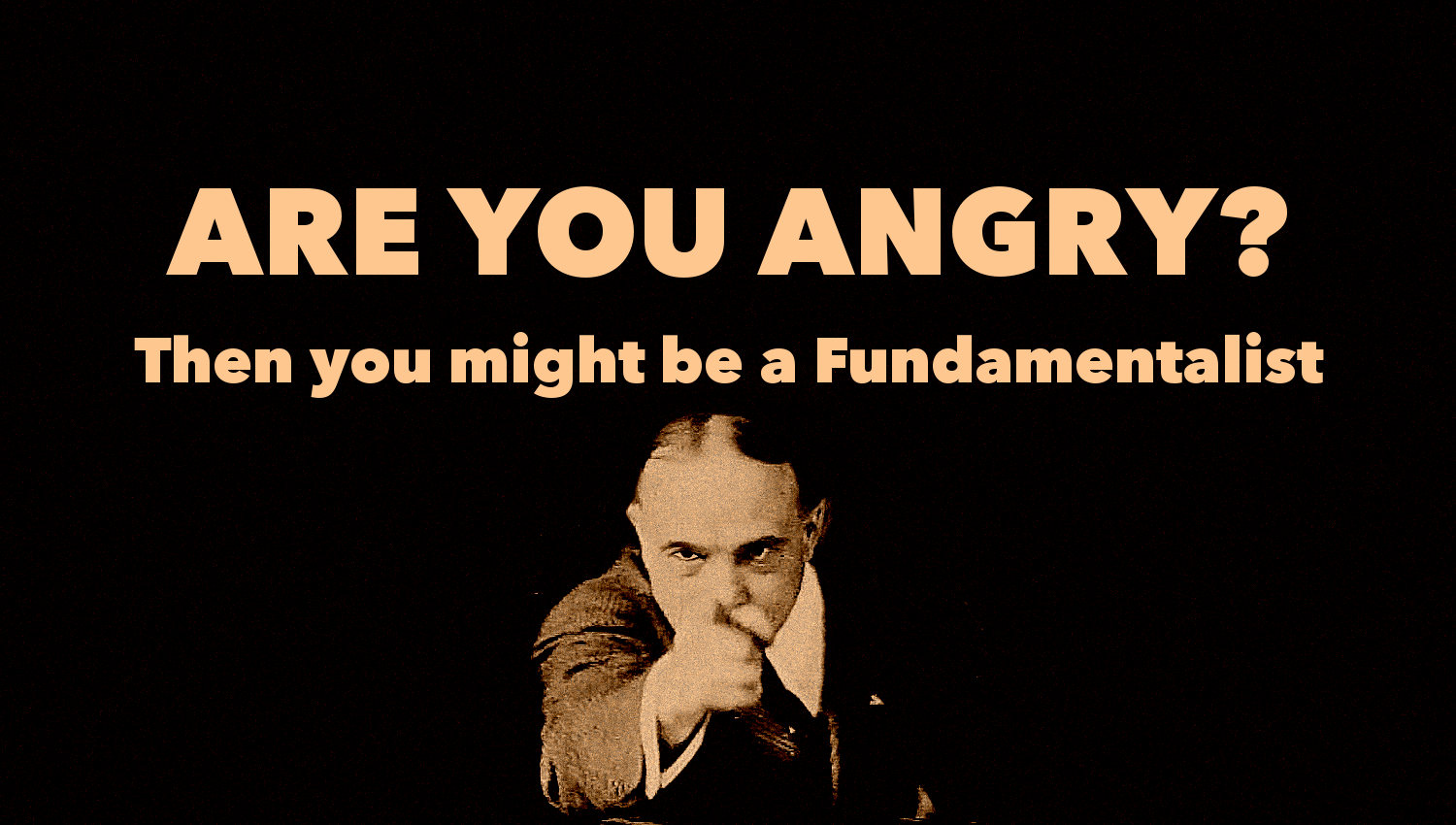 Are you an Evangelical who is angry about something? Then you might be a fundamentalist! Dr. George Marsden is an expert on the history of American Evangelicalism and in his book Fundamentalism and American Culture he defines a "fundamentalist" as "an evangelical who is angry about something." Who is a fundamentalist? Marsden says it is any evangelical that has "relative degrees of militancy in support of conservative . . . issues." Marsden defines a fundamentalist by a person's militant support of any religious and social controversy, not only by a religious test for orthodoxy on key issues.
Are you an Evangelical who is angry about something? Then you might be a fundamentalist! Dr. George Marsden is an expert on the history of American Evangelicalism and in his book Fundamentalism and American Culture he defines a "fundamentalist" as "an evangelical who is angry about something." Who is a fundamentalist? Marsden says it is any evangelical that has "relative degrees of militancy in support of conservative . . . issues." Marsden defines a fundamentalist by a person's militant support of any religious and social controversy, not only by a religious test for orthodoxy on key issues.
George Marsden said, "My own unscientific shorthand for this broader usage is that a fundamentalist (or a fundamentalistic evangelical) is 'an evangelical who is angry about something.' By this standard, it should be carefully noted, the operational distinction between simply being an evangelical and being what I am calling a fundamentalistic evangelical involves their relative degrees of militancy in support of conservative doctrinal, ecclesiastical, and/or cultural issues. 'Evangelical' is broadly defined to include those in traditions that emphasize the Bible as the highest religious authority, the necessity of being 'born again' or regenerated through the atoning work of Christ on the cross, pietistic devotions and morals, and the necessity of sharing the Gospel through evangelism and missions. Because the terms are used in so many different ways, however, it is nearly impossible to get a clear reading on the size of these groups, although there is no doubt that they have become a significant factor in American politics." [1]
Once upon a time, people were proud to be called a fundamentalist, but today the term "fundamentalist" is a pejorative. In many ways, fundamentalist is an archaism that has been replaced by the term evangelical today. (Perhaps an evangelical is a fundamentalist who isn't angry?) In yesteryear, "fundamentalism" referred to anyone who elevated any number of conservative christian issues to a religious test for orthodoxy, such that unless you affirmed these key issues, then you were not truly a Christian at best, or an enemy of the faith at worst. These tests typically included strict affirmation of: 1. biblical inerrancy (or other inspired dictation theories), 2. young earth creationism (or general antipathy to modern science, especially evolution), 3. miracles (especially the Virgin Birth), 4. premillennialism (or other forms of millennialism), 5. religious separatism, 6. penal substitutionary atonement (or other forms of substitutionary atonement), and other religious tests such as those found in The Fundamentals (1910-1915) essays.
Marsden's definition of a fundamentalist as "an evangelical who is angry about something", is more relevant today because many evangelicals are quick to call anyone a heretic that has a slightest difference in opinion on any theological issue—not just the six examples listed above. So according to Marsden, a fundamentalist is defined by how angry an evangelical is about any given issue, and how militantly opposed they are to others who have a different opinion. For instance, traditionally heresy referred to the particular ideas that were rejected by the ecumenical councils, and heretics were the specific individuals the ecumenical councils condemned for teaching those heretical ideas. Today's fundamentalistic evangelicals use the terms heresy and heretic to reject to anything or anyone who holds a different opinion, representing xenophobia and general 'othering' of anyone whom they are angry and are militantly opposed, and unwillingness to engage in any ecumenical dialog.
So are you angry? Are you militantly supporting or opposing a key issue? Then you might be a fundamentalist.
Sources:
1. George Marsden, Fundamentalism and American Culture. Oxford University Press, 2006. pp. 235-6.



November 22nd, 2017 - 14:34
Not to debate that issue, which I agree with, but I see many angry progressives today.
February 12th, 2018 - 07:26
Anger and denunciation is required by all true Shepards of Christ’s flock when a false Gospel is proffered on God’s people. Galatians 1: 6-10 comes to mind. Our Lord himself is angry at the wicked every day and calls upon them to repent and be saved. That is how any of us come to faith. By the way, I do not self identify as a Fundamentialist or as an Evangelical but as an Orthodox and Reformed Christian.
February 12th, 2018 - 09:40
Anger is also an emotion of the oppressed, so you are right that anger is expected in different contexts.
June 16th, 2020 - 09:39
And anger will lead to your own destruction.It creates hell on Earth.Jesus taught forgiveness.